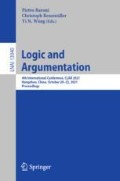Abstract
In abstract argumentation, multiple argumentation semantics for choosing sets of jointly acceptable arguments have been defined. In the principle-based approach, multiple principles have been proposed and formalized in order to guide the choice for a semantics and the search for new semantics. Admissibility is a central principle satisfied by many semantics, including complete, stable, grounded and preferred. A more recently introduced principle is the INRA principle, motivated by considerations about the relevance of arguments and supported by a cognitive study. This paper additionally introduces and motivates the SAFWOC principle in order to positively distinguish less abstention-friendly semantics like preferred and stable from more abstention-friendly semantics like grounded and complete. After observing that no existing semantics satisfies these three principles, we define the novel choice-preferred semantics that satisfies the three principles. Additionally we show that choice-preferred satisfies further desirable principles like existence, directionality, SCC-recursiveness and completeness.
Access this chapter
Tax calculation will be finalised at checkout
Purchases are for personal use only
References
Baroni, P., Caminada, M., Giacomin, M.: An introduction to argumentation semantics. Knowl. Eng. Rev. 26(4), 365–410 (2011). https://doi.org/10.1017/S0269888911000166
Baroni, P., Giacomin, M.: On principle-based evaluation of extension-based argumentation semantics. Artif. Intell. 171(10), 675–700 (2007). https://doi.org/10.1016/j.artint.2007.04.004
Baroni, P., Giacomin, M., Guida, G.: SCC-recursiveness: a general schema for argumentation semantics. Artif. Intell. 168(1), 162–210 (2005)
Baumann, R., Brewka, G., Ulbricht, M.: Revisiting the foundations of abstract argumentation-semantics based on weak admissibility and weak defense. In: Proceedings of the AAAI Conference on Artificial Intelligence, vol. 34, pp. 2742–2749 (2020)
Cramer, M., Guillaume, M.: Empirical cognitive study on abstract argumentation semantics. In: Frontiers in Artificial Intelligence and Applications, pp. 413–424 (2018)
Cramer, M., Guillaume, M.: Empirical study on human evaluation of complex argumentation frameworks. In: Calimeri, F., Leone, N., Manna, M. (eds.) JELIA 2019. LNCS (LNAI), vol. 11468, pp. 102–115. Springer, Cham (2019). https://doi.org/10.1007/978-3-030-19570-0_7
Cramer, M., van der Torre, L.: SCF2 - an argumentation semantics for rational human judgments on argument acceptability. In: Beierle, C., Ragni, M., Stolzenburg, F., Thimm, M. (eds.) Proceedings of the 8th Workshop on Dynamics of Knowledge and Belief (DKB’19) and the 7th Workshop KI & Kognition (KIK’19). CEUR Workshop Proceedings, vol. 2445, pp. 24–35. CEUR-WS.org (2019)
Dauphin, J., Rienstra, T., van der Torre, L.: A principle-based analysis of weakly admissible semantics. In: Prakken, H., Bistarelli, S., Santini, F., Taticchi, C. (eds.) Computational Models of Argument - Proceedings of COMMA 2020, Perugia, Italy, 4–11 September 2020. Frontiers in Artificial Intelligence and Applications, vol. 326, pp. 167–178. IOS Press (2020). https://doi.org/10.3233/FAIA200502
Dung, P.M.: On the acceptability of arguments and its fundamental role in nonmonotonic reasoning, logic programming and n-person games. Artif. Intell. 77(2), 321–357 (1995)
Dvorák, W., Gaggl, S.A.: Incorporating stage semantics in the SCC-recursive schema for argumentation semantics. In: In Proceedings of the 14th International Workshop on Non-Monotonic Reasoning (NMR 2012) (2012)
Dvořák, W., Gaggl, S.A.: Stage semantics and the SCC-recursive schema for argumentation semantics. J. Log. Comput. 26(4), 1149–1202 (2016). https://doi.org/10.1093/logcom/exu006
Rahwan, I., Simari, G.R.: Argumentation in Artificial Intelligence, 1st edn. Springer, Heidelberg (2009). https://doi.org/10.1007/978-0-387-98197-0
van der Torre, L., Vesic, S.: The principle-based approach to abstract argumentation semantics. In: Baroni, P., Gabbay, D., Giacomin, M., van der Torre, L. (eds.) Handbook of Formal Argumentation. College Publications (2018)
Author information
Authors and Affiliations
Corresponding author
Editor information
Editors and Affiliations
Rights and permissions
Copyright information
© 2021 Springer Nature Switzerland AG
About this paper
Cite this paper
Cramer, M., Spörl, Y. (2021). The Choice-Preferred Semantics for Relevance-Oriented Acceptance of Admissible Sets of Arguments. In: Baroni, P., Benzmüller, C., Wáng, Y.N. (eds) Logic and Argumentation. CLAR 2021. Lecture Notes in Computer Science(), vol 13040. Springer, Cham. https://doi.org/10.1007/978-3-030-89391-0_6
Download citation
DOI: https://doi.org/10.1007/978-3-030-89391-0_6
Published:
Publisher Name: Springer, Cham
Print ISBN: 978-3-030-89390-3
Online ISBN: 978-3-030-89391-0
eBook Packages: Computer ScienceComputer Science (R0)

